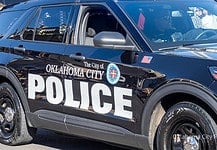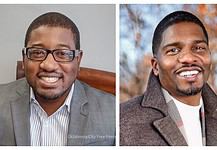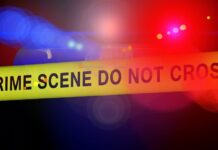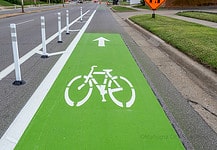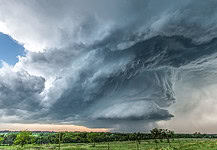Last Updated on October 25, 2023, 11:37 AM | Published: October 24, 2023
OKLAHOMA CITY — In the Oklahoma City Council meeting Tuesday, two local religious leaders, one Jewish, the other Muslim, joined together to reaffirm their friendship and commitment to peace.
Their appearance was in response to increasing tensions within the United States and specifically in Oklahoma City triggered by violent events occurring in the current Israeli-Palestinian conflict in the Middle East.
Rabbi Vered L. Harris, spiritual leader of the Temple B’nai Israel in Oklahoma City, and Dr. Imad Enchassi, senior imam of the Islamic Society of Greater Oklahoma City, stood side-by-side before the Council to publicly affirm their personal commitment to peace and unity and the same commitment of their respective congregations.
Enchassi revealed that since the early October violence, he had received “five death threats” and acknowledged the threats against Harris during cycles of hate in Oklahoma.
Rabbi Harris
Harris spoke first, identifying herself as “the daughter of an Israeli, a lifelong Jew, and an ordained rabbi.”
Harris (speaking in the feature photo) has been the Rabbi for the Temple B’nai Israel for over a decade and is only the fifth rabbi in the congregation’s history that began before Oklahoma statehood.
“The past 18 days have been emotionally wrenching,” Harris said. “My family from Israel had loved ones murdered in cold blood on October 7. I have first cousins in the reserves now called up to serve in the Israel Defense Forces.
Harris said that she did not know any Jewish persons in OKC, “who is more than three degrees of separation from knowing someone murdered or kidnapped on October 7, or called up to serve in the IDF because of this war.”
“I ask my congregation all the time to answer three questions: What can I do? What am I willing to do? What am I not willing to do?”
In this case, Harris answered those three questions for herself in front of the Council:
- “I can and am willing to stand with my friend the Imam to say Oklahoma City is not (with all due respect) the Holy Land, and tensions there need not break our hope for friendship here.”
- “I am not willing to ignore the pain of my neighbor. I am not willing to stay silent when I hear anti-Muslim rhetoric. I am not willing to give up hope that we can live in peace and with respect.”
- “I can invite you all, as City Councilmembers, to get to know my Jewish congregation, what matters to us, and what we believe. What is happening on the world stage is a matter for the Federal Government. What is happening right here in Oklahoma City is a matter for you, for us.”
Harris asked all residents of Oklahoma City to “see and hear and seek to understand the complexities of circumstances our Jewish and Muslim residents are facing — from global trauma to local antisemitism and Islamophobia to wonderful and beautiful commitments between Jewish and Muslim neighbors to forge the kind of friendships that hasten more kindness in the world.”
She concluded by inviting anyone to join the Temple B’nai Israel congregation any Friday night.
Imam Enchassi
As Enchassi began his comments, it was clear that he was struggling to keep from crying as he said, “Rabbi varied Harris is my best friend.”
He identified himself as “a Palestinian who grew up in Beirut, Lebanon.”
Enchassi has been in Oklahoma City long enough to have seen some difficult times for Muslims within a state that is very often dominated by those who espouse hate toward Muslims or anyone who is perceived as different.
He and Harris have teamed up on many occasions to present alternatives to the wall of hate and threats too often rising in the state when world events trigger some persons to express that hate.
Enchassi recounted the fact that he grew up in a refugee camp in Beirut, a place that was created by the struggles with hatred in the region between Jews and Muslims.
He then moved to Lubbock, Texas in 1983. Eight years later he moved to Oklahoma City where he has raised a family and now has grandchildren in the metro over the last 32 years.
But, in those 32 years, there have been times of extreme cultural tensions.

“On April 19 1995, the Alfred E. Murrah building bombing, I write in my book now, was John Doe number two, or as I call it in my book, John Moe number two,” said Enchassi.
He was referring to what some believed at the time was Timothy McVeigh’s accomplice in the bomb-laden truck with him. Enchassi was not that person but many in the community turned him in to the FBI. Their first reaction was to believe he was. Even the U.S. government assumed the bombing was a foreign operation for a time.
However, later investigations showed that the bombing was carried out by American right-wing extremists Timothy McVeigh and Terry Nichols in an attempt to start a revolt against the United States government.
McVeigh was executed for his crime of devising the plot and carrying it out with the aid of Nichols.
According to the FBI, “A total of 168 people were killed, including 19 children, and more than 500 were injured.”
Enchassi said that he, his family, and his community lived in fear during that time being viewed “through the lens of guilt rather than the innocence we were promised in the Constitution.”
Interfaith organization in OKC
Enchassi recalled that the first interfaith organization in Oklahoma City started right after the Oklahoma City bombing.
“Almost three decades later, I stand before you as one of the leaders of the interfaith movement in Oklahoma City that eventually became a nationwide and a global movement,” said Enchassi.
He told of further efforts in OKC to bridge the cultural divides after 9-11 and the first Muslim Day at the Oklahoma Capitol in 2015 where one representative called him the biggest terrorist in Oklahoma City.
In recalling a trip to the Holy Land he took with Christians and Jews in Oklahoma City and the impact that had, he said, “Upon returning to Oklahoma, we all came to a stark realization that regardless of what religious communities we belong to, the path towards a solution for peace in the Middle East is complex, and very, very complicated. When the terror again broke out, on October 7, the first person I called was Rabbi Vered.”
Losses
Enchassi, too, has lost loved ones from the current violence between Israel and Palestinians in the Gaza Strip.
He said that he had lost four members of his family and that there were four orphans living with their grandmother. He doesn’t even know where they are buried.
“You must understand that what’s happening halfway across the world cannot be understood in a Tick Tock video or through a news clip,” said Enchassi. “More than seven decades have brought us to where we are here today.”
‘Stand united’
Referring to Rabbi Harris standing next to him, Enchassi said, “Today, we stand united, unwavering in our condemnation of Islamophobia, antisemitism, hate-based violence, and xenophobia. We implore the City Council of Oklahoma City to join us in affirming that Oklahoma City is a place where religious diversity is valued, protected, and promoted.”
Both the mosque and the synagogue are in Ward 2 represented by Councilman James Cooper who knows the two leaders and invited them to speak.
His response was to commit to visiting both places of worship.
Founder, publisher, and editor of Oklahoma City Free Press. Brett continues to contribute reports and photography to this site as he runs the business.


